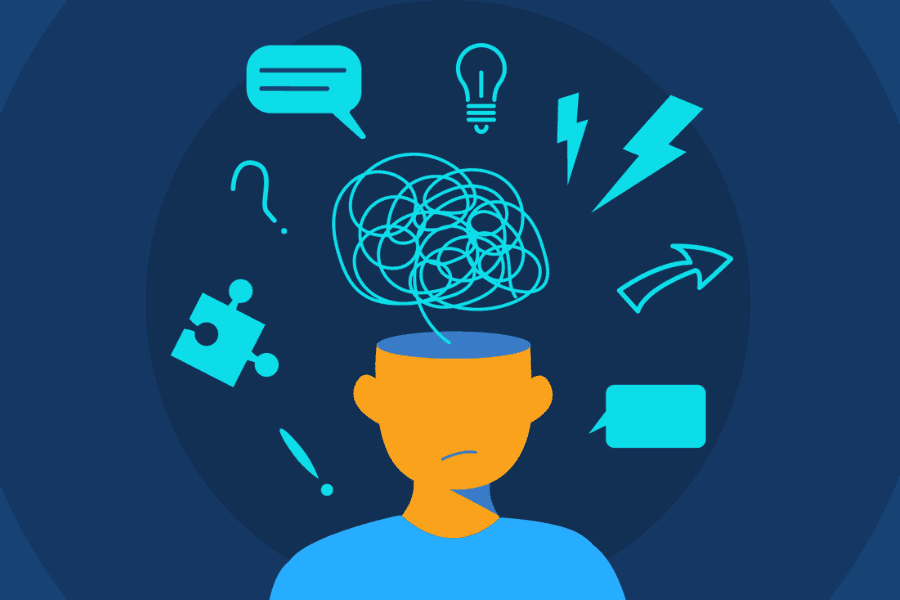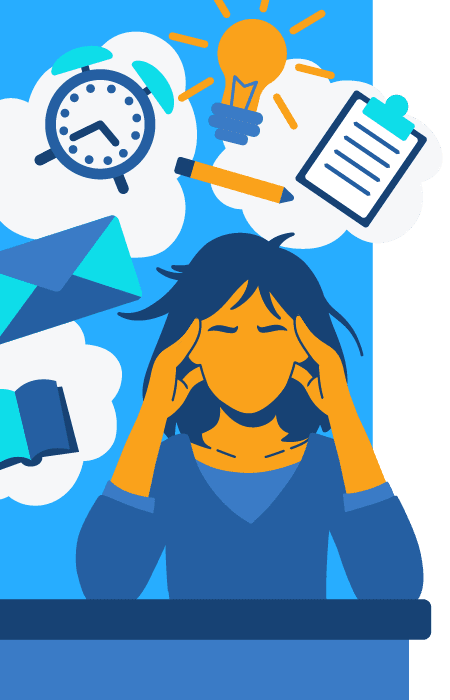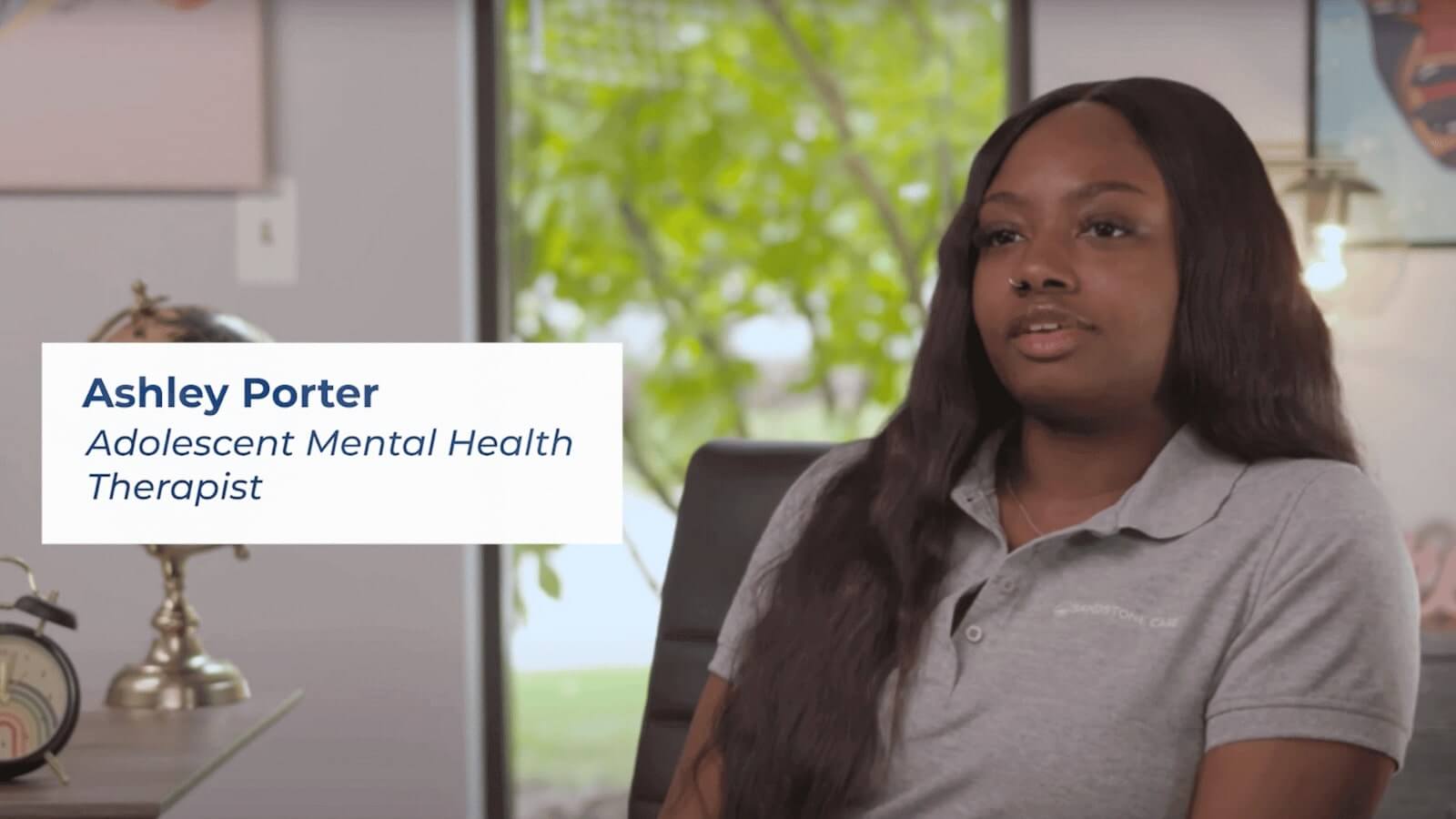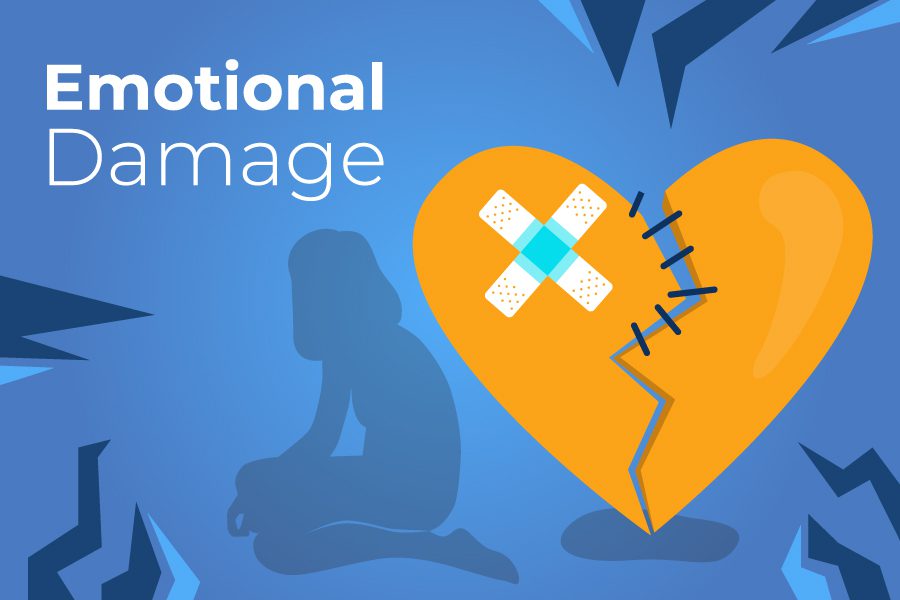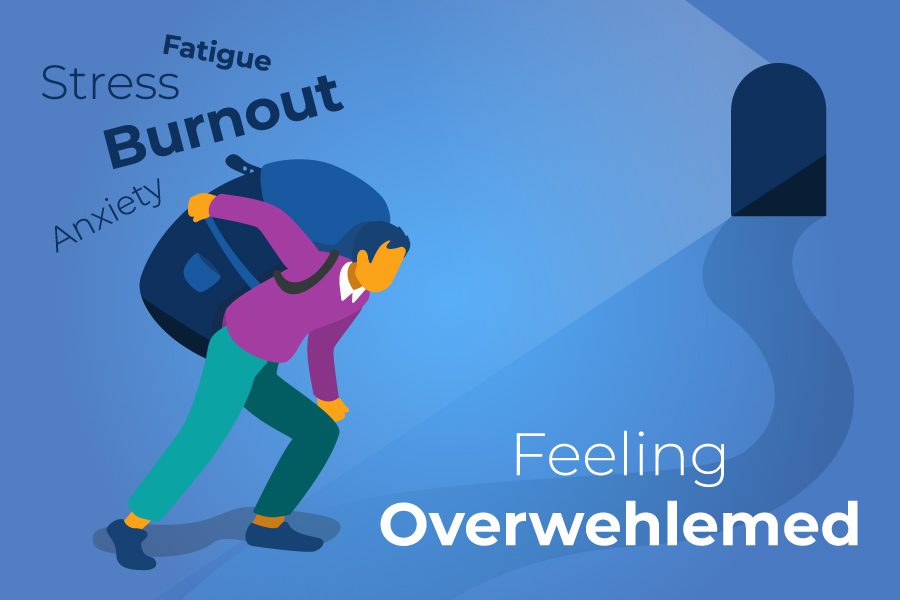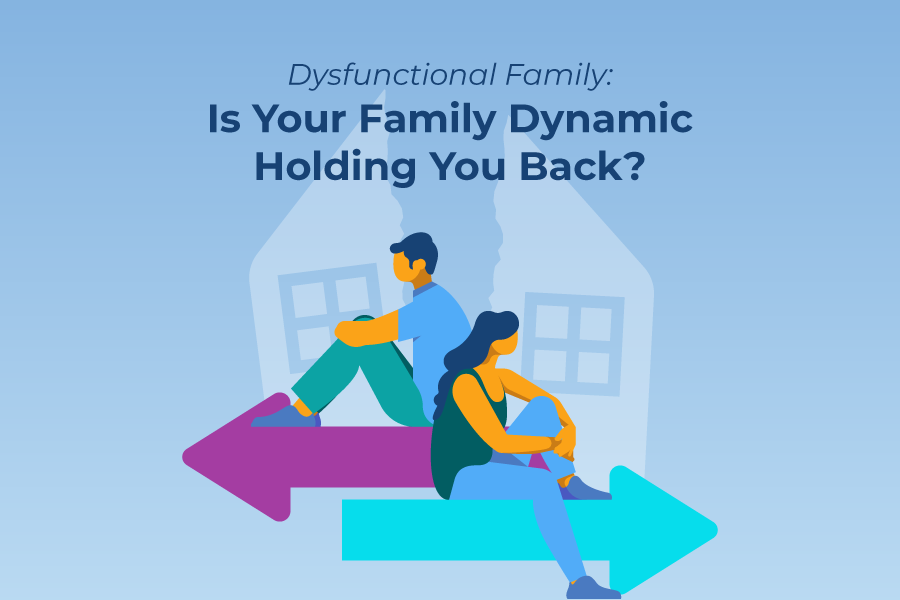What Is ADHD?
Attention-Deficit / Hyperactivity Disorder (ADHD) is a common neurodevelopmental disorder.
ADHD is typically diagnosed in childhood. It is chronic, which means it can be a lifelong condition.
A person with ADHD may have difficulty paying attention, controlling impulsive behaviors, or having a high amount of energy.
ADHD can be presented in three different ways, according to the Centers For Disease Control and Prevention (CDC). These can include:
- Predominantly Inattentive Presentation
- Predominantly Hyperactive-Impulsive Presentation
- Combined Presentation
ADHD symptoms in an individual can change over time. It is important to be aware of the signs and educate yourself about ADHD to better understand it and get help.
What is the Difference Between ADHD and ADD?
Attention Deficit Disorder (ADD) is an old term that was used for what is now known as ADHD.
Sometimes, ADD is used to refer to the inattentive presentation of ADHD.
What Percent of the Population has ADHD?
ADHD is a common neurodevelopmental disorder in young children.
According to the CDC, among children in the U.S. ages 12-17, 13% have ADHD.
ADHD is also one of the most frequently discussed and diagnosed mental health disorders in the United States, particularly for children and adolescents. The National Institute of Mental Health reports that 9% of children ages 13-17 have been diagnosed with ADHD.
ADHD is diagnosed when symptoms adversely affect the person at school, home, and/or socially. Those with ADHD often have trouble staying on task or focusing, and there can be a marked increase in impulsive behaviors. Individuals can also show hyperactivity. As with any mental health issue, the severity of the condition can range greatly for each individual.
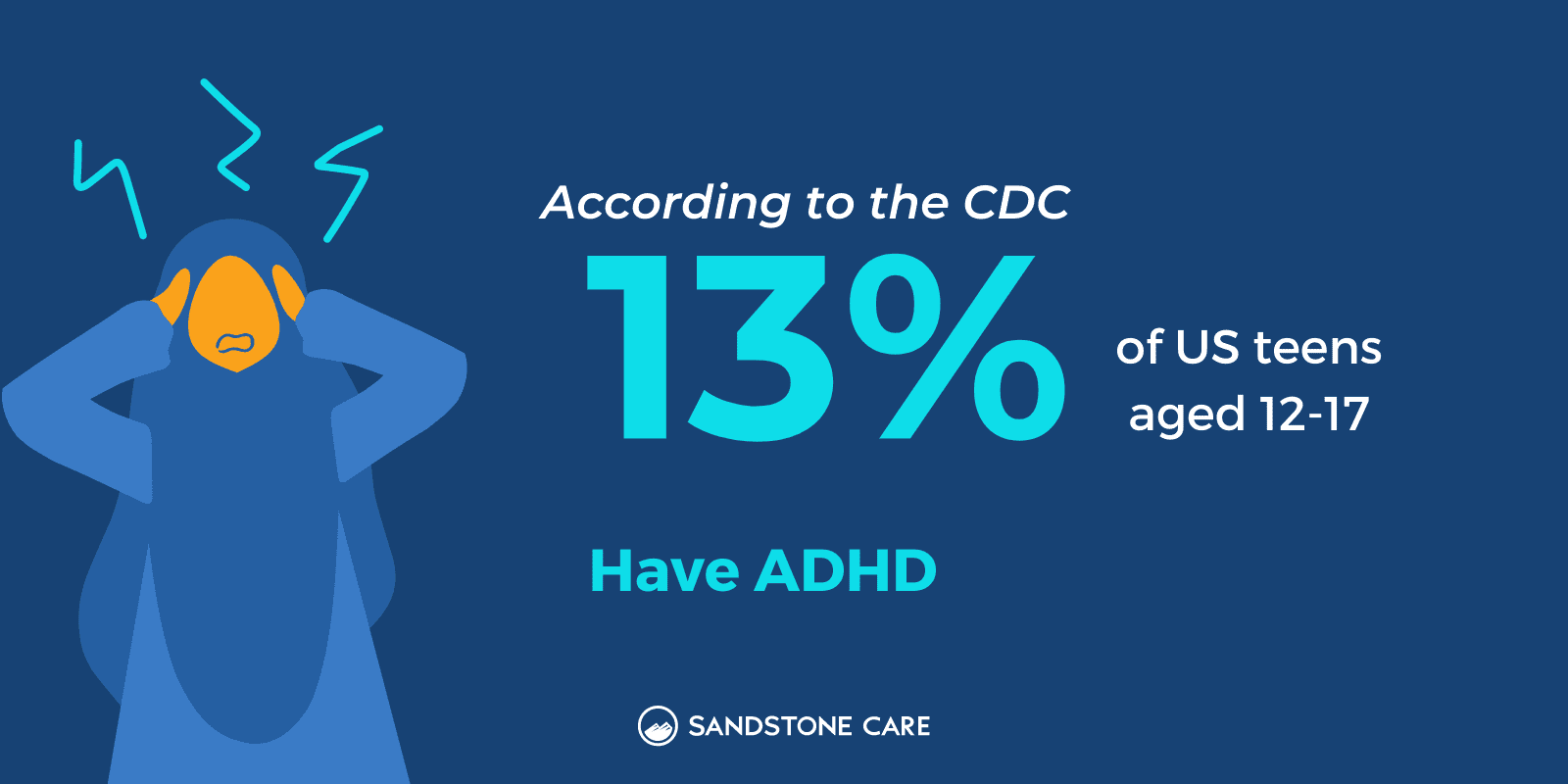
Is ADHD Developed, Or are You Born with It?
There is no clear answer as to whether ADHD develops or if a person is born with it.
Genetic factors have been linked with ADHD. However, there are some studies that look into other factors like brain injury and environmental risks.
Is ADHD a Mental Illness Or a Coping Mechanism?
ADHD is a mental illness common among children and can last lifelong.
Types of ADHD & Effects
What are the Types of ADHD?
The types of ADHD include:
- Predominantly Inattentive Presentation, where it is hard for individuals to finish tasks, pay attention to detail, or follow conversations.
- Predominantly Hyperactive-Impulsive Presentation, which involves fidgeting and excessive talking.
- Combined type, which involves symptoms of both inattentive and hyperactive-impulsive presentation.
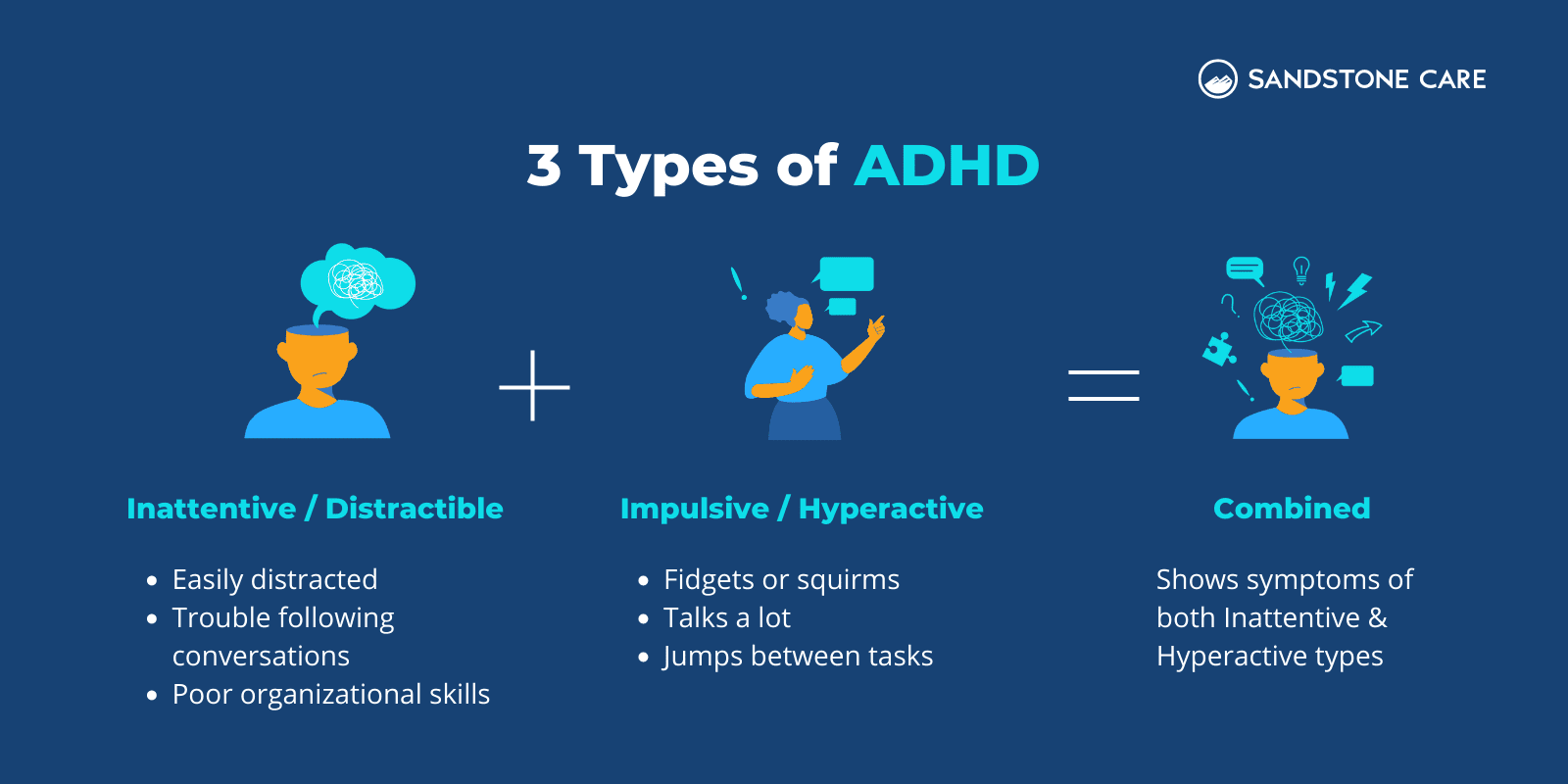
Does ADHD Affect Memory?
According to Neuropsychology, ADHD can be associated with impairments in working memory.
Working memory is a system that plays an important role in the way people process, use, and remember information every day.
How Does Sugar Affect ADHD?
Research does not support the idea that sugar causes ADHD. However, some studies suggest that high sugar intake may worsen the symptoms of ADHD, especially in children.
A child with ADHD who consumes high sugar may experience more restlessness and hyperactivity.
More research needs to be done to analyze the correlation between ADHD and sugar consumption.
Why Does Coffee Make ADHD People Sleepy?
Caffeine affects all people differently, but some people with ADHD become sleepy or feel somewhat “normal” after drinking coffee.
This may be because individuals with ADHD often have low dopamine levels, and caffeine may raise those levels.
However, a person shouldn’t self-medicate with caffeine without talking to their healthcare provider first.
What Causes ADHD
What Causes ADHD?
The exact causes and risk factors of ADHD are unknown. However, current research suggests that genetic factors play a role.
Other studies are being done regarding other causes of ADHD, including:
- Brain injury
- Environmental factors, like lead during pregnancy or at a young age
- Alcohol or tobacco use during pregnancy
- Premature delivery or low birth weight
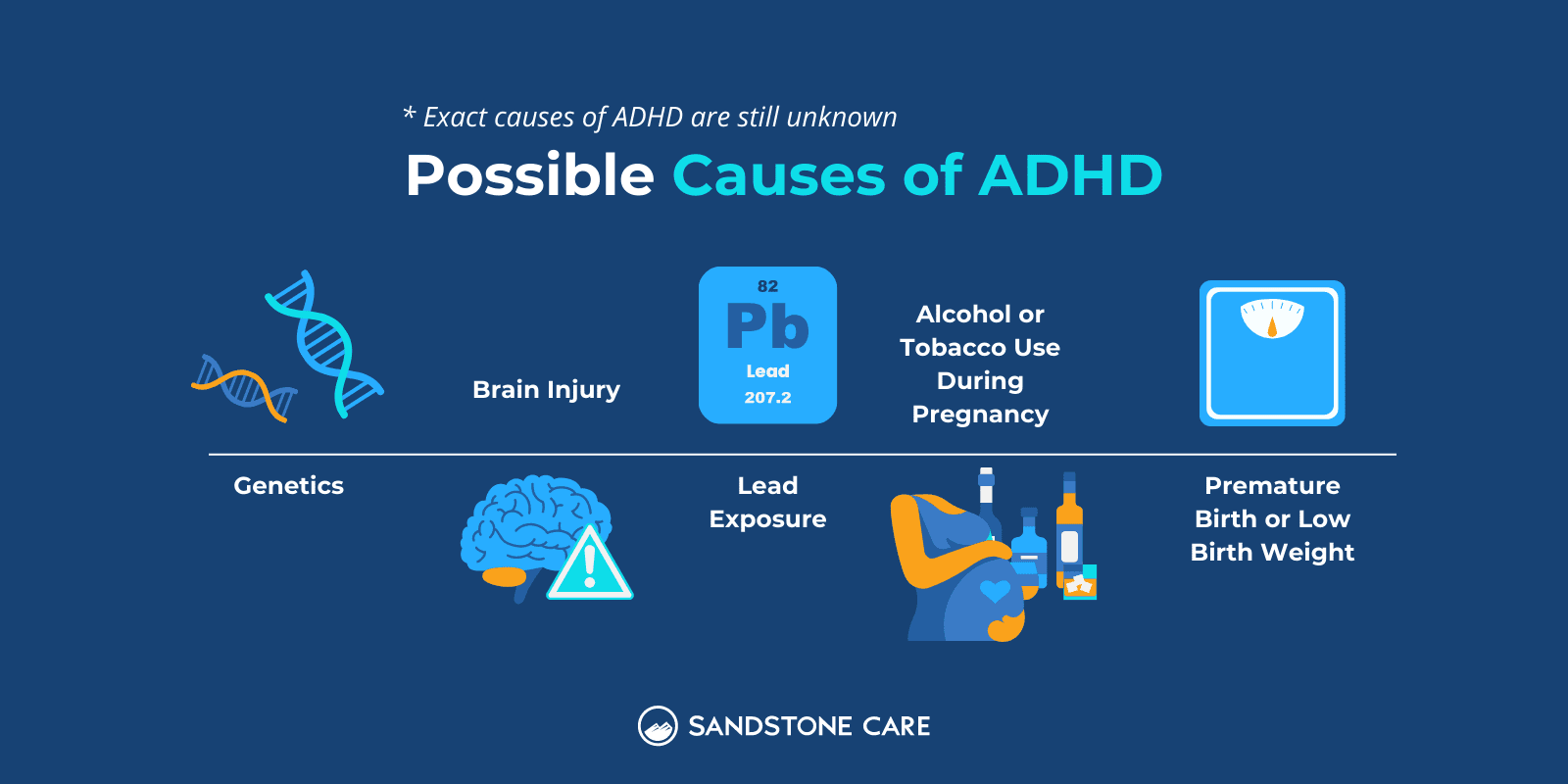
Is ADHD Genetic?
Changes in genes have been associated with ADHD, according to MedlinePlus.
Research suggests that genetic factors play a role in the development of ADHD.
What Age Does ADHD Peak?
Symptoms of ADHD often peak in children around ages 7 to 8. However, ADHD is a chronic condition, and symptoms will likely persist into adulthood.
Why Is ADHD So Common Today?
Now that there is more awareness and recognition of ADHD, it is more commonly diagnosed and talked about.
ADHD has been around, but before thorough research, people may have been unsure what was causing their symptoms and how to get help.
What Population Is Most Affected By ADHD?
ADHD is most commonly diagnosed in younger children, around the age of 6.
Data from the CDC from 2016-2019 shows that children in the United States who were diagnosed with ADHD included:
- 265,000 children 3 to 5 years old
- 2.4 million children 6 to 11 years old
- 3.3 million adolescents ages 12 to 17 years old
ADHD is more commonly reported in boys than girls. However, it is a condition that can affect anyone regardless of gender.
Is ADHD Caused by Trauma?
Exposure to trauma in childhood can cause changes in the brain that may affect ADHD symptoms.
However, it is unknown if trauma causes ADHD, and more research is needed.
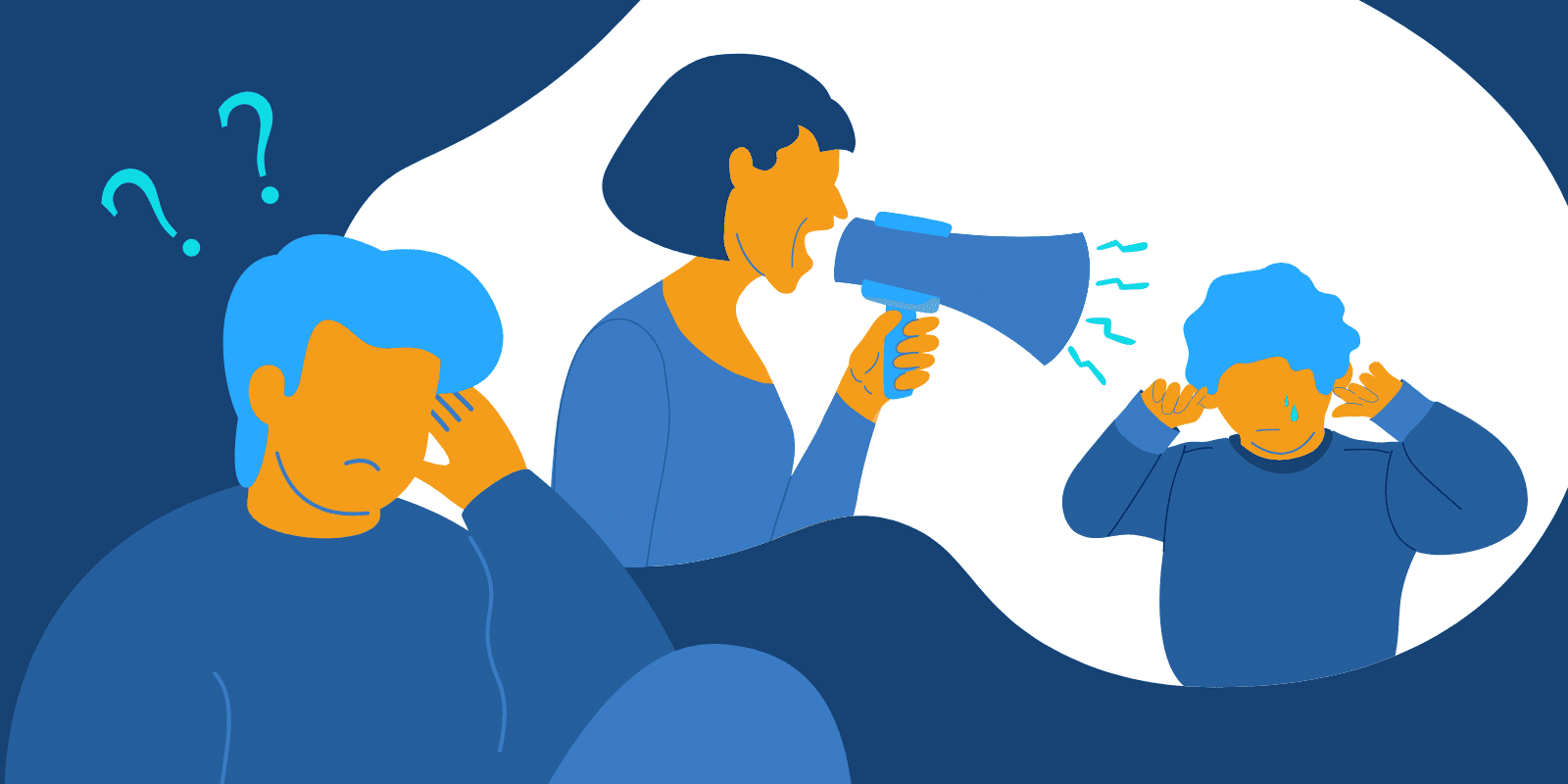
Can Emotional Neglect Cause ADHD?
It is unsure of the exact cause of ADHD and emotional neglect has not been found to be a cause of ADHD.
However, some studies have found ADHD to be associated with childhood maltreatment.
Experiencing emotional neglect in childhood can put children at higher risk of numerous mental health conditions that stay with them well into their adult years.
What are Some ADHD Triggers?
ADHD triggers are unique to each person.
However, common ADHD triggers can include:
- Stress
- Lack of sleep
- Certain foods
- Medications
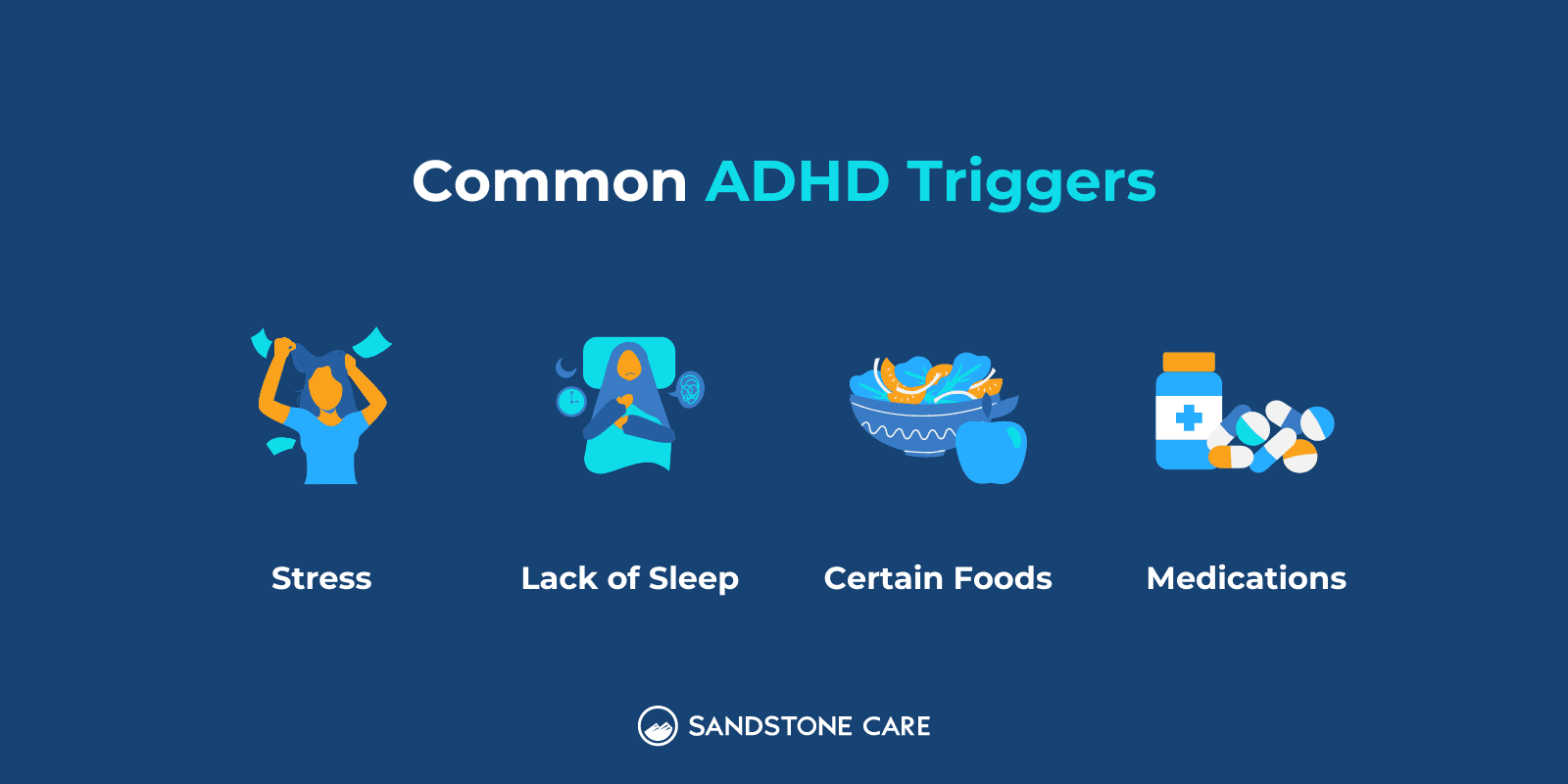
ADHD Symptoms
What are the 3 Main Symptoms of ADHD?
Three of the main symptoms of ADHD include:
- Impulsivity
- Inattention
- Hyperactivity
With impulsivity, a person with ADHD may interrupt others or make decisions without thinking before they act.
Inattention in a person with ADHD may look like a short attention span, having a hard time paying attention to detail, being easily distracted, being forgetful, or having a hard time staying organized.
Lastly, hyperactivity in ADHD can manifest as a constant need to be moving, having trouble staying still, fidgeting, avoiding tasks, talking excessively, having a hard time engaging in quiet activities, or having a hard time staying on one task. They also may struggle with delaying gratification.
The DSM-V (the official archive of mental health conditions) describes ADHD as “a persistent pattern of inattention and/or hyperactivity-impulsivity that interfere with functioning or development” with a minimum of six symptoms (for those under 17) lasting for at least six months.
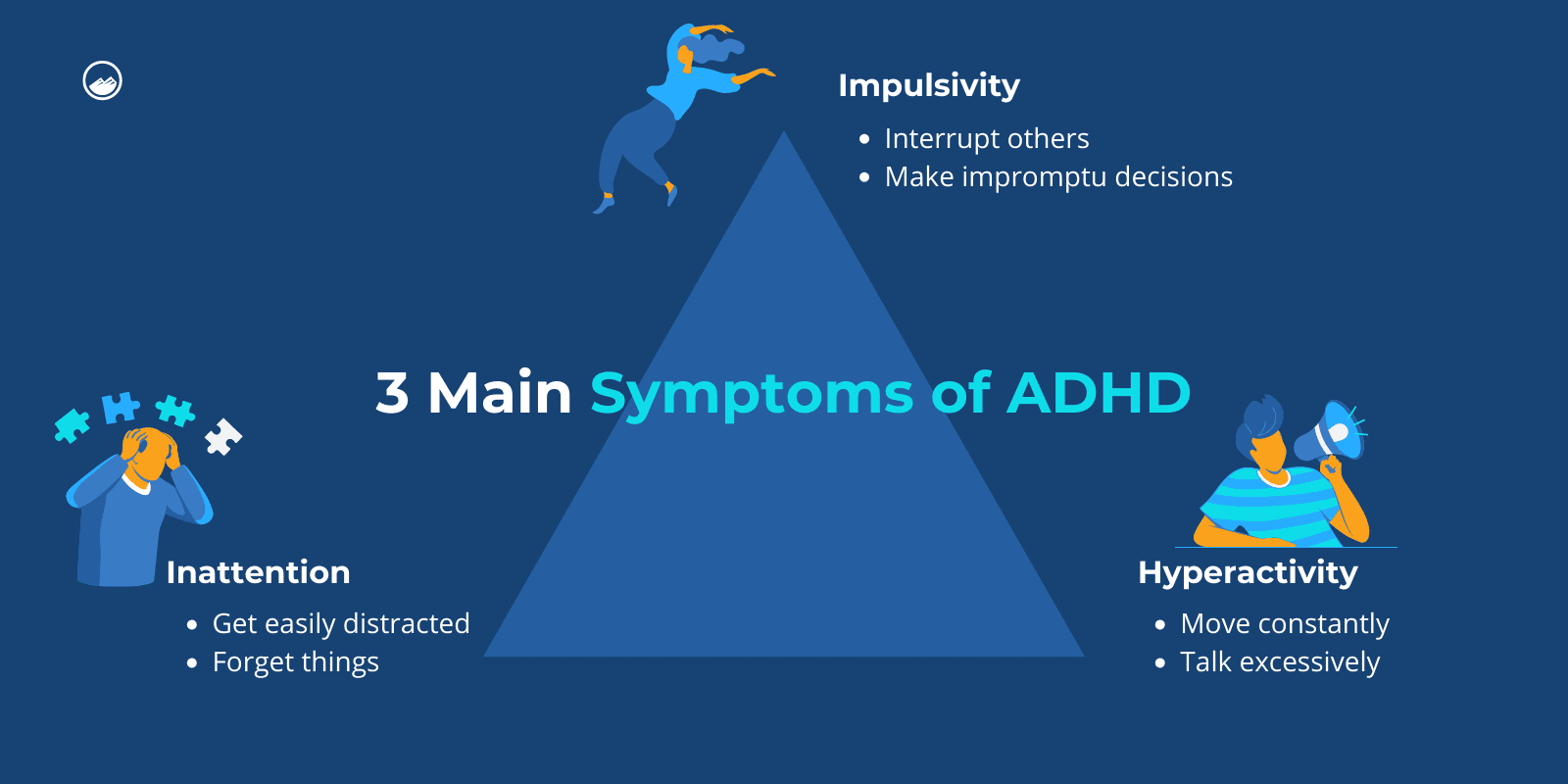
What are the Symptoms of ADHD?
Symptoms of ADHD can include:
- Trouble paying close attention to detail
- Difficulty holding attention
- Executive dysfunction
- Trouble organizing tasks or activities
- Often loses things
- Easily distracted
- Forgetful
- Fidgeting
- Often “on the go”
- Talks excessively
Symptoms of ADHD can be different from person to person because there are different presentations of ADHD.
What are Unusual Symptoms of ADHD?
Some symptoms of ADHD may not be as common or clear as others.
For example, many people with ADHD may have difficulty focusing on certain things or tasks, but some people with ADHD may be hyperfocused.
They may concentrate on one task for a very long time. Some people with ADHD concentrate so intensely on a task that they lose track of time.
Another less common symptom of ADHD can be impulsive shopping.
While many people without ADHD may do this, sometimes impulsive shopping can be a way to cope with emotions and behaviors related to ADHD.
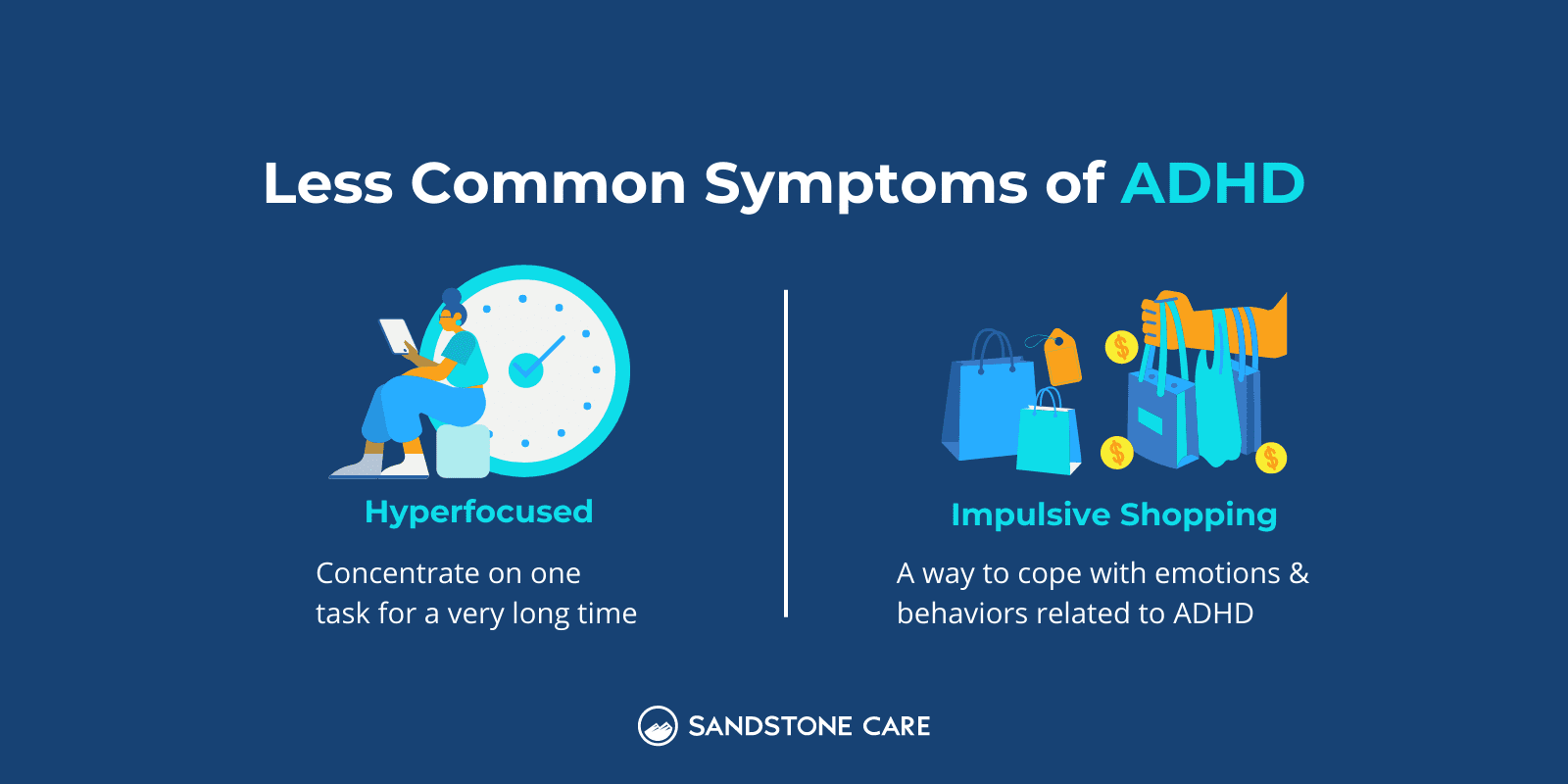
What is ADHD Paralysis?
ADHD paralysis is a term used to describe the feeling of being overwhelmed by tasks, to the point of being unable to start or complete them.
It is a common experience for individuals with ADHD, who may struggle with executive functioning skills such as organization, prioritization, and time management. The feeling of paralysis can lead to procrastination, avoidance, and a sense of frustration and self-criticism.
What are Some ADHD Habits?
Certain habits in both children and adults can stem from ADHD.
These habits can include:
- Constantly losing things
- Hyperfixating on hobbies or tasks
- Being late often
- Feeling fidgety when trying to sit down or listen to someone
- Impulsivity
- Being sidetracked easily
- Having a difficult time listening to someone
- Interrupting others when they are talking
- Always multitasking
- Procrastinating or avoiding difficult tasks
- Having trouble finishing tasks
ADHD Diagnosis
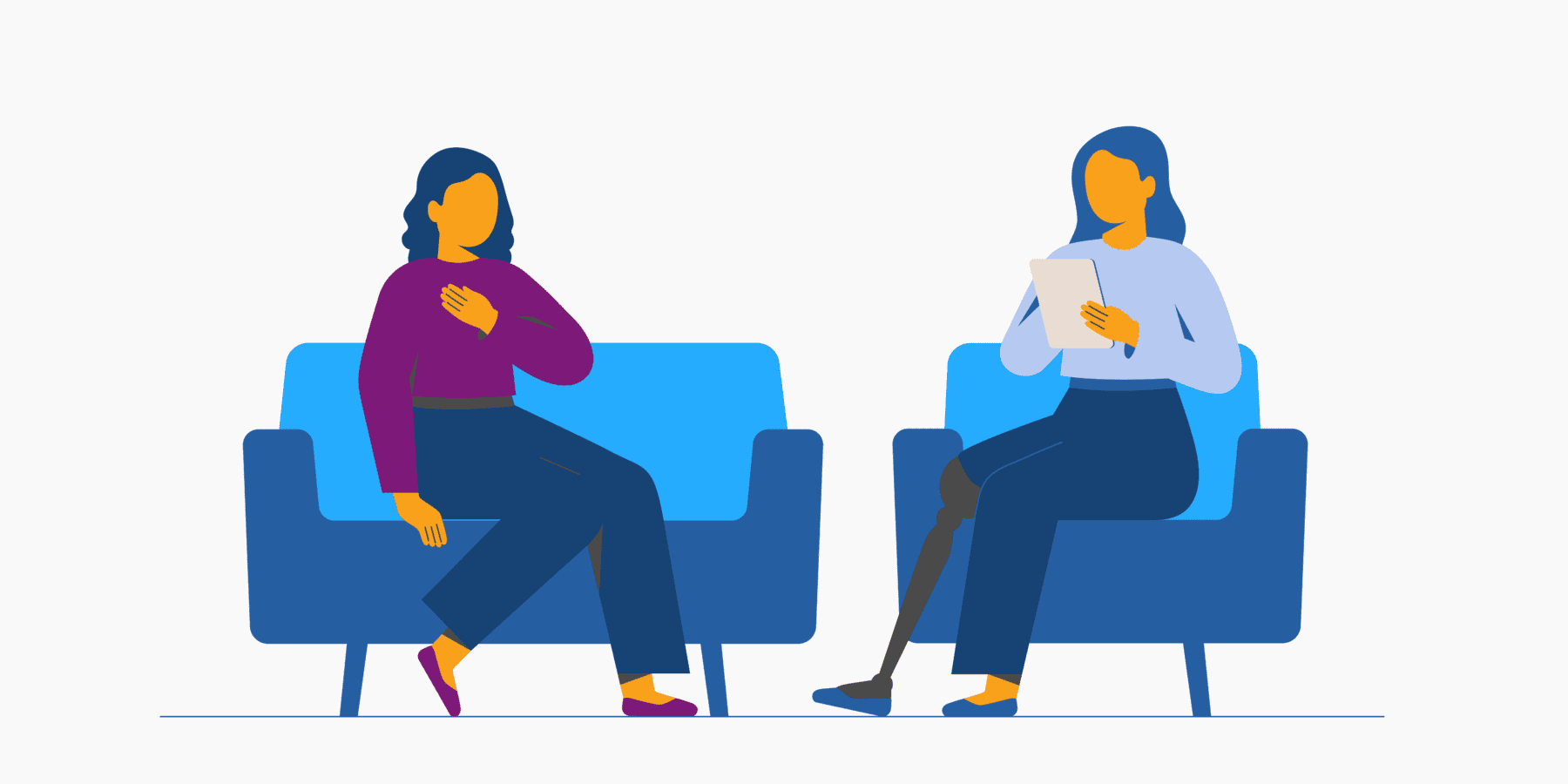
How Do You Know If You Have ADHD?
If you or a loved one are experiencing symptoms that may be related to ADHD, you should reach out for help to your healthcare provider or a mental health professional to get a proper diagnosis.
Educating yourself about the signs and symptoms of ADHD can help you recognize when help might be needed.
Those that do not understand the nature of this illness often equate a child with ADHD as being troublesome, bad at school or poorly parented. None of these are true and only add to the stress and difficulty of living with ADHD.
A failure to recognize ADHD symptoms can often result in someone seeing themselves in a negative light. For example, they may think, “If I always struggle to follow the rules in school then I must be a bad student.”
As an individual gets older, it is common for this to become a self-perpetuating negative cycle. A teen that struggles to follow directives in school finds it easier to simply not try on an assignment rather than try and fail. This action leads to reprimands for not completing the assignment.
The negative action and response simply reaffirm the teen’s sense of self as a poor student. This skewed sense of self can carry through adolescence to young adulthood and beyond.
How Do You Test For ADHD?
There is no single test for ADHD, and a diagnosis of ADHD involves several different steps.
A healthcare provider may do medical tests, like hearing and vision exams, to rule out other conditions first.
Symptoms of ADHD can share similarities with several different mental health conditions, such as anxiety, depression, sleep disorders, or learning disabilities. So, it is important to go through a thorough evaluation and assessment before an ADHD diagnosis.
A healthcare provider will use the American Psychiatric Association’s Diagnostic and Statistical Manual of Mental Disorders, Fifth Edition (DSM-5), as a guideline for properly diagnosing and treating ADHD.

Do I have ADHD? Take ADHD Test Now
Can You Self-diagnose ADHD?
If you suspect you or a loved one may have ADHD, the best thing to do is seek professional help and get a proper diagnosis of ADHD.
While it is commonplace for the term ADHD to be casually used to describe normal distractibility or procrastination, it is important to note that proper diagnosis is necessary and essential. An individual must be evaluated and tested by qualified clinical professionals to be correctly diagnosed.
Sometimes people can be misdiagnosed when behavioral problems are confused for ADHD symptoms. Correct evaluation is necessary for finding the proper treatment.
Do I Have ADHD or Anxiety?
Anxiety involves feelings of fear, worry, and uneasiness.
Anxiety disorders involve anxiety that does not go away and may worsen over time.
ADHD and anxiety disorders are both mental health conditions but have significant differences.
However, it is not uncommon for an individual with ADHD to have anxiety as well.
The best way to know whether you have ADHD or anxiety is to consult with a doctor or mental health professional.
Adult ADHD
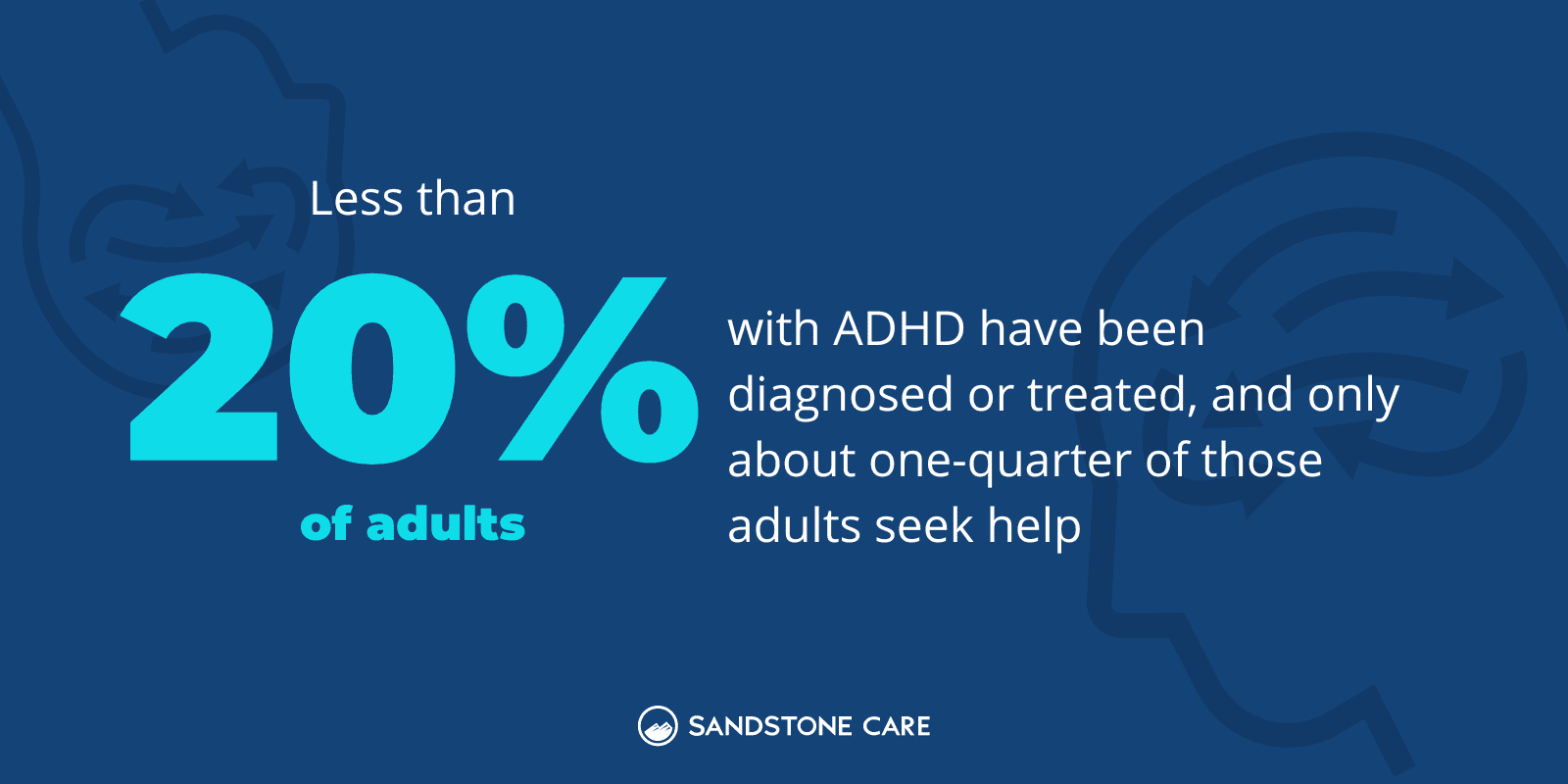
What are the Signs of ADHD in Adults?
ADHD can look different between children and adults.
Some common signs of ADHD in adults can involve:
- Careless mistakes
- Lack of attention to detail
- Constantly losing things
- Restlessness
- Forgetfulness
- Starting new tasks before finishing another
- Having trouble staying organized
- Fidgeting
- Mood swings, irritability, short temper
- Engaging in risky behavior
- Having a hard time dealing with stress
- Often interrupting others
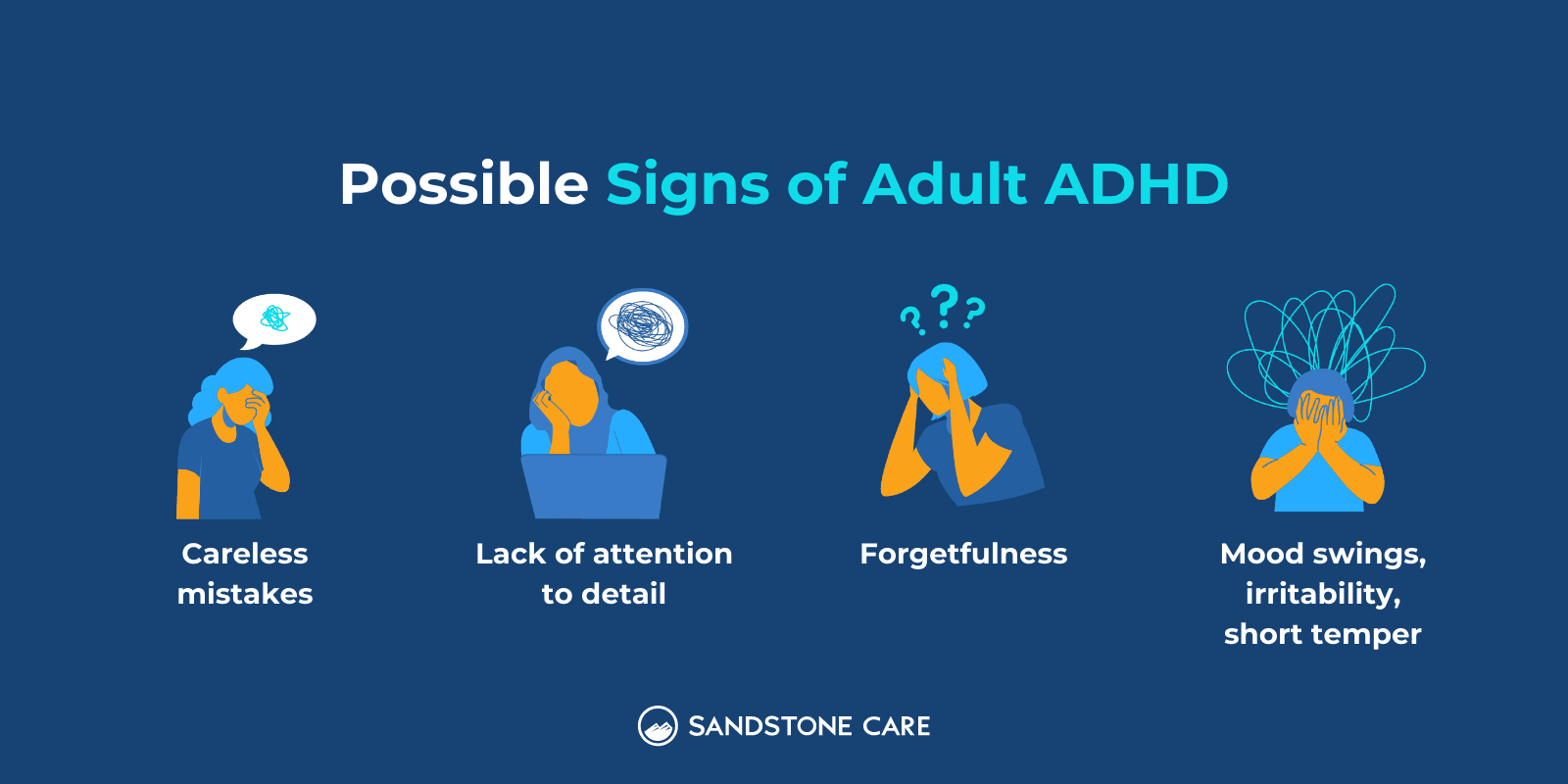
What Can Trigger ADHD in Adults?
Triggers for ADHD depend on each individual.
However, some common triggers for ADHD in adults can include:
- Poor sleep
- Medications
- Stressful life events
- Medical conditions
- Nutritional deficiencies
- Excessive screentime
- Substance use
What Happens To Adults With Undiagnosed ADHD?
An adult with undiagnosed ADHD will often face challenges at work, at home, and in their personal life.
When a person doesn’t get help for ADHD, it can worsen over time and make it very difficult to function on an everyday basis.
What’s The Treatment For ADHD In Adults?
Most commonly, ADHD in adults is treated with a combination of behavioral therapy and medication.
Finding a treatment program that best fits the individual’s needs is important. What works for some may not work for others.
ADHD in Women
What are the Signs of ADHD in Women?
Some of the more common signs of ADHD in women can include:
- Disorganization
- Trouble listening or paying attention
- Indecision
- Overspending
- Forgetfulness
- Difficulty concentrating
How Does ADHD Look Different in Females?
Women tend to experience fewer symptoms of hyperactivity and impulsivity and commonly experience more inattentiveness.
Inattentive ADHD commonly involves forgetfulness, difficulty staying organized, or difficulty focusing.
Because of this, they often internalize their symptoms, making it harder to recognize the signs of ADHD.
ADHD in females can also be undiagnosed or misdiagnosed as other mental health conditions.
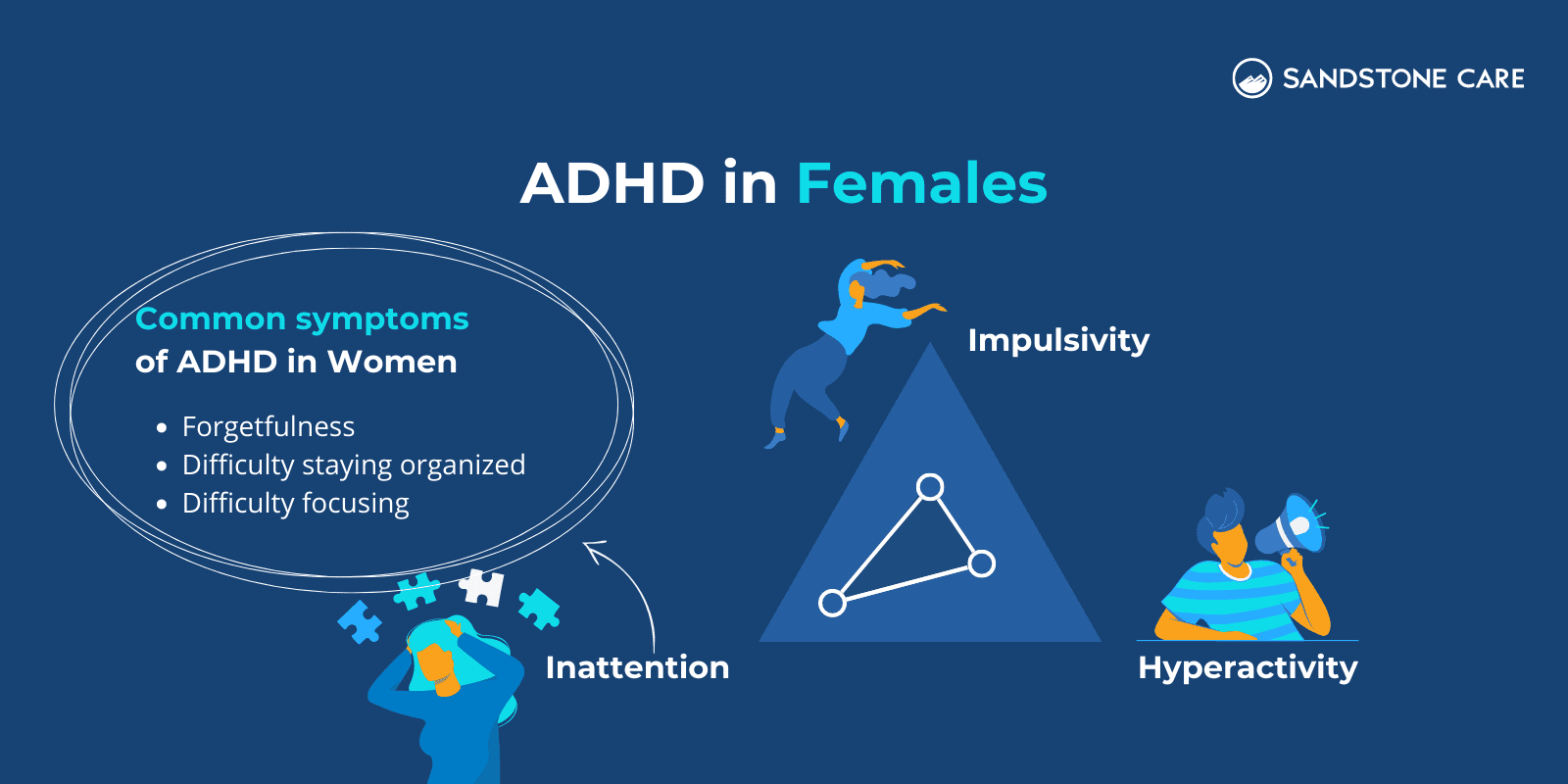
Why is It So Hard to Get Diagnosed with ADHD as a Woman?
It is harder to get diagnosed with ADHD as a woman because their symptoms are often presented in the form of inattentiveness, which is often internalized. This makes it hard to identify the signs of ADHD and get the help they need.
Symptoms of ADHD in women also share many similarities with other mental health conditions, especially anxiety, which often leads to misdiagnosis.
ADHD Coping Skills
Can You Manage ADHD Without Medication?
It is possible to manage ADHD without medication.
Some people find behavioral therapies to be more effective in managing their ADHD symptoms than medication.
How Do ADHD Adults Cope?
Some ways people cope and manage symptoms of ADHD can include:
- Practicing healthy eating habits
- Getting daily physical activity
- Limiting daily screen time
- Getting a good amount of sleep
- Practicing mindfulness or meditation
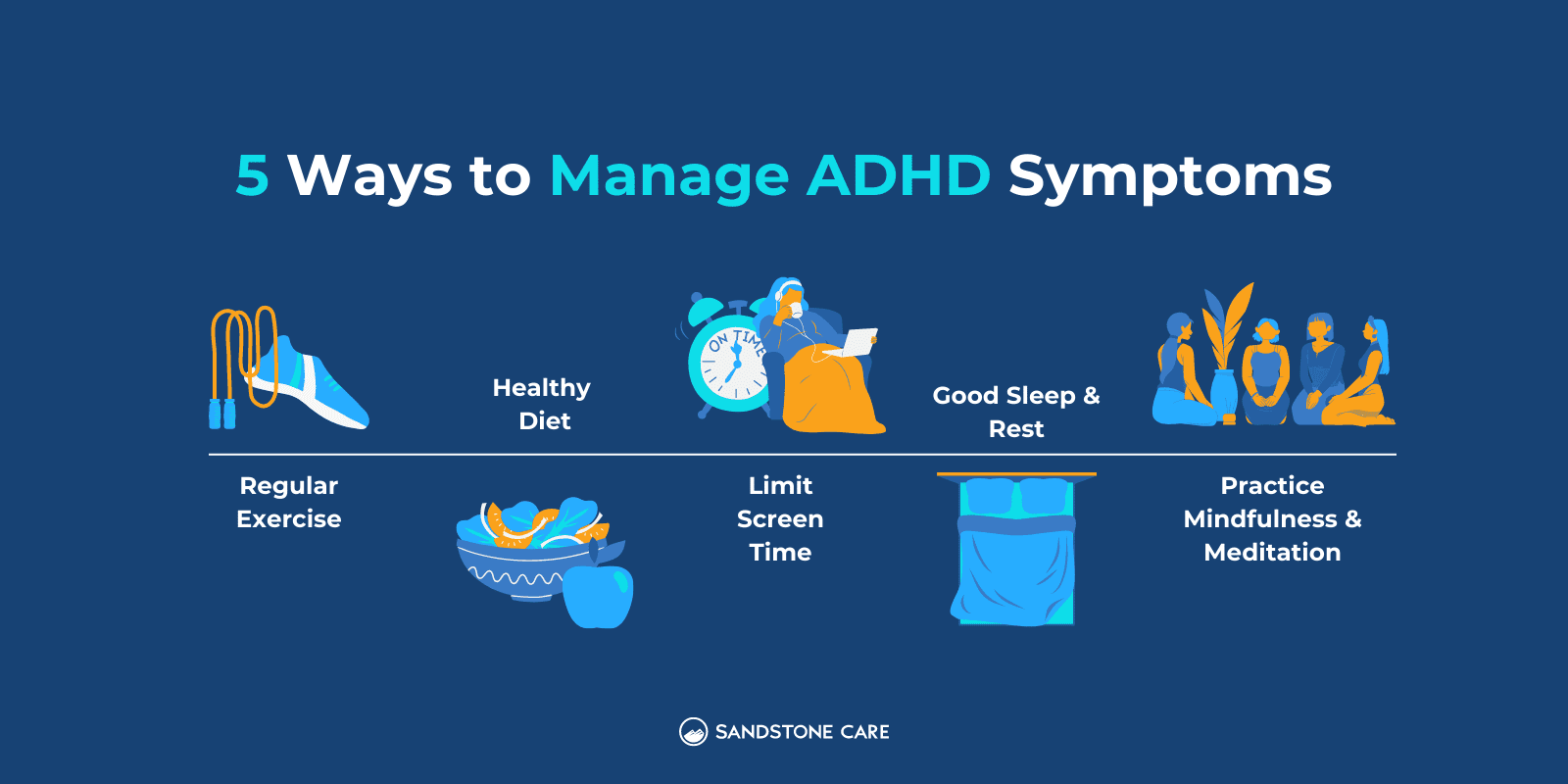
Does Caffeine Help ADHD?
Some people with ADHD report feeling better after drinking caffeine, while others report feeling worsened symptoms and heightened anxiety after drinking caffeine.
More research is needed to determine the safety and efficiency of caffeine in helping ADHD symptoms.
What Motivates an ADHD Person?
Sometimes, people with ADHD may find it hard to complete a task.
Learning how to break big tasks down into smaller ones can be helpful to feel motivated to complete others.
However, it is important to learn what works for each individual. For some, doing it this way may feel even more overwhelming than trying to focus on the bigger picture.
ADHD Treatment
Does ADHD Go Away?
ADHD does not just go away on its own.
If left untreated, it often gets worse.
ADHD is a chronic condition that lasts for years or even a lifetime.
Everyone can find it difficult to complete work or stay focused, however, when symptoms become unmanageable and begin to negatively affect someone’s life it is appropriate to seek out help.
Millions of individuals struggle with these symptoms everyday and navigate their world with the help of both therapeutic and psychiatric treatments. We know that ADHD does not have to determine performance in school or dictate overall success.
What are Some Treatments for ADHD?
Treatment for ADHD involves:
- Behavioral therapy
- Medication
Cognitive behavioral therapy (CBT) is a common psychotherapy used for a wide variety of mental health and substance use disorders, including ADHD. Through CBT, a person can learn to identify and restructure negative or unhealthy thought processes and change behaviors.
For parents with children diagnosed with ADHD, behavioral parent training is a treatment that focuses on helping parents teach their kids everyday strategies to manage the symptoms of ADHD.
Medications for ADHD can involve both stimulant and non-stimulant medications.
What is The Best Way to Cure ADHD?
ADHD is not curable, but it can be treated and managed.
The best way to treat ADHD is to first find what works for you, and it often involves behavioral therapies and/or medication.
ADHD Meds
When Should You Medicate for ADHD?
It is important to talk to a health care provider or mental health professional to determine when you should medicate for ADHD.
You should not start or stop any medications for ADHD without talking to your doctor first.
A child who is struggling with ADHD can often develop issues of self-esteem, anxiety or depression. It is understandable that those with ADHD, particularly when untreated, have an increased risk of substance abuse, and can turn to self-medication.
While there is a legitimate place for psychiatric medications in treating ADHD, many of these medications are amphetamines and it is possible for them to become drugs of abuse when not used as prescribed.
Additionally, because there is an illicit market for these “study drugs,” sometimes teens and young adults can become involved in buying or selling them, introducing them to a social circle that may expand their access to substances in general.
It is important for teens and their families to be mindful of the potential for ADHD to lead to substance abuse, especially since drug interactions, such as Adderall and alcohol, can have devastating health consequences.
What are the Top 3 ADHD Medications?
Stimulants, like medications that include amphetamine or methylphenidate, are the most commonly prescribed medications for ADHD.
Some of these can include Adderall, Ritalin, or Dexedrine.
Some non–stimulant medications are also sometimes prescribed for ADHD, like atomoxetine, guanfacine, or clonidine.
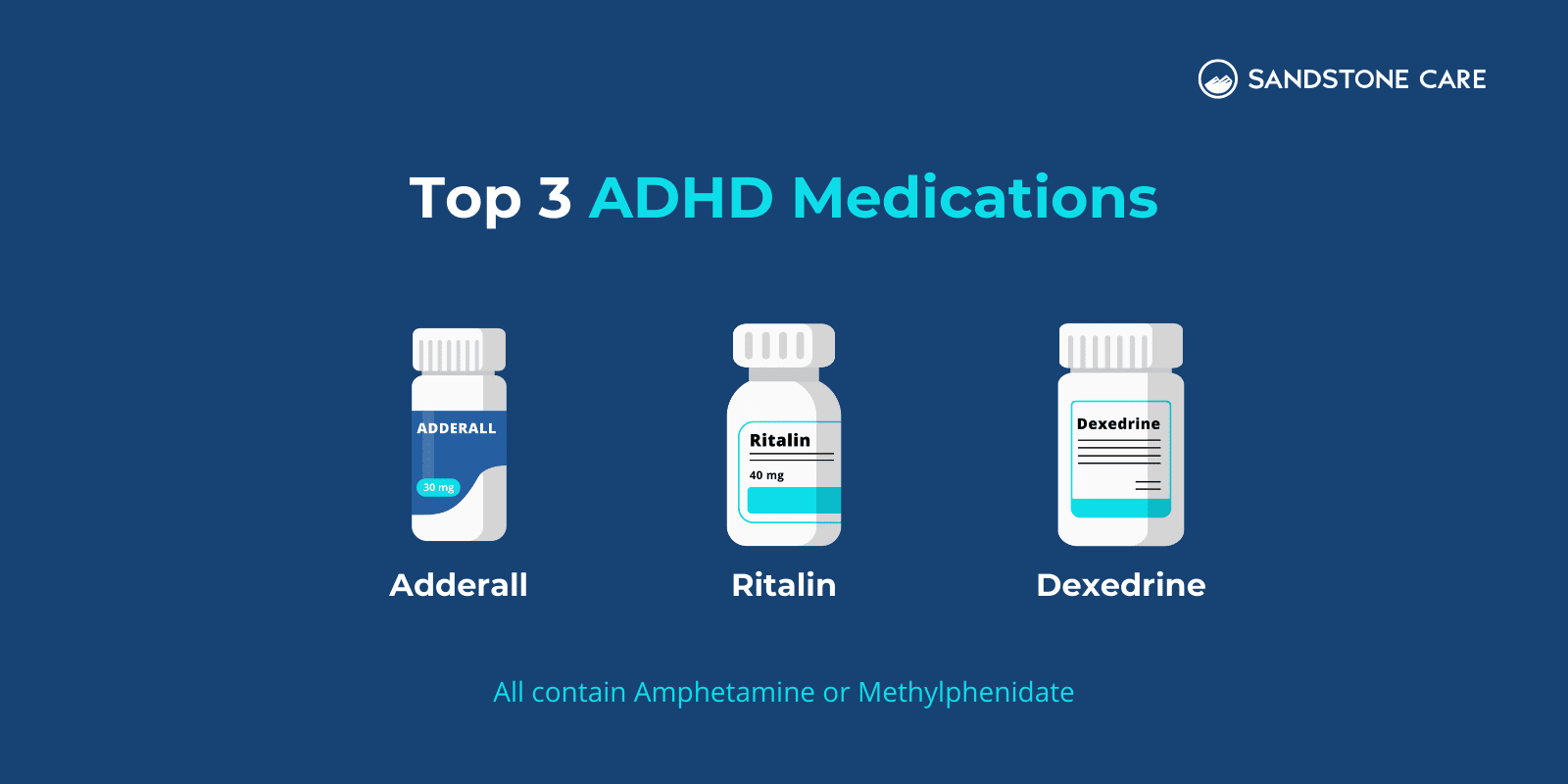
What is the Most Popular Medication for ADHD?
Stimulants are the most commonly prescribed medications for ADHD.
FAQ
You have questions. We have answers.
Our goal is to provide the most helpful information. Please reach out to us if you have any additional questions. We are here to help in any way we can.
ADHD is considered a disability under the Americans with Disabilities Act (ADA) and the United States Social Security Administration.
If a person has ADHD, their work and school should be able to accommodate, and there may also be benefits available.
ADHD is considered a developmental disability, which is a group of conditions that come from an impairment in physical, learning, language, and behavior areas.
ADHD is not on the autism spectrum, but they do share some similar symptoms.
Childhood ADHD may reduce life expectancy for reasons related to cognition, occupation, education, finances, family, and overall health.
Autism spectrum disorder (ASD) is defined by the CDC as “a developmental disability caused by differences in the brain.”
ASD involves a series of developmental disorders that involve language, skills, socializing, behavior, and learning.
ADHD impacts how a person concentrates, thinks, and acts.
Dopamine is an important neurotransmitter that plays a role in pleasure, satisfaction, and motivation.
In individuals with ADHD, dopamine levels are different compared to individuals without ADHD.
It is believed that people with ADHD have a higher dopamine transporter density, which results in a lower level of dopamine.
Because of this, medications that boost dopamine levels may be helpful for individuals with ADHD.


Let’s take the next steps together
Are you struggling with focus, organization, and staying on task? ADHD can make everyday life feel like an uphill battle. Let us help you find the support and resources you need to manage your ADHD symptoms and thrive. Take the first step today!


